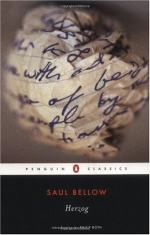|
This section contains 301 words (approx. 1 page at 400 words per page) |

|
Herzog Summary & Study Guide Description
Herzog Summary & Study Guide includes comprehensive information and analysis to help you understand the book. This study guide contains the following sections:
This detailed literature summary also contains Bibliography and a Free Quiz on Herzog by Saul Bellow.
After its publication in 1964, Herzog became a bestseller, cementing Saul Bellow's reputation with the publicas well as the criticsas one of the most important American writers of the twentieth century. The novel won the National Book Award for fiction and earned Bellow the International Literary Prize, honoring him as the first American recipient. The novel has won praise for its penetrating, sometimes humorous, portrait of a middle-aged man searching for meaning and selfhood in the anxietyridden America of the 1960s.
The novel is a series of fragmented reflections, often revealed in an epistolary, or letter, format. Moses Herzog, the main character, becomes obsessed with writing letters to "everyone under the sun," living or deceased, including his family, friends, enemies, and historical figures. Over the past few months, he has experienced a spiritual and emotional paralysis, triggered by the breakup of his marriage and his contemplation of the wasteland of modern life, "down in the mire of post-Renaissance, post-humanistic, post-Cartesian dissolution, next door to the void." In the letters, Herzog examines and evaluates various philosophical theories, recalls fond images of his childhood, apologizes to ignored friends and lovers, and especially berates those, like his wife and her lover, who have caused his suffering. Seymour Epstein, in his article on Bellow for The Denver Quarterly, notes that the letters reflect a need "to feel a passionate faith in some higher order, intelligence, or idea that will do as medium through which one can seek transcendence."
During the course of the novel, Herzog is forced to cope with his sense of alienation and displacement as he analyzes his past and tries to determine his future. By the end of the novel, his search has resulted in a tenuous, but nevertheless satisfying, restoration of his faith in himself and in humanity.
Read more from the Study Guide
|
This section contains 301 words (approx. 1 page at 400 words per page) |

|



